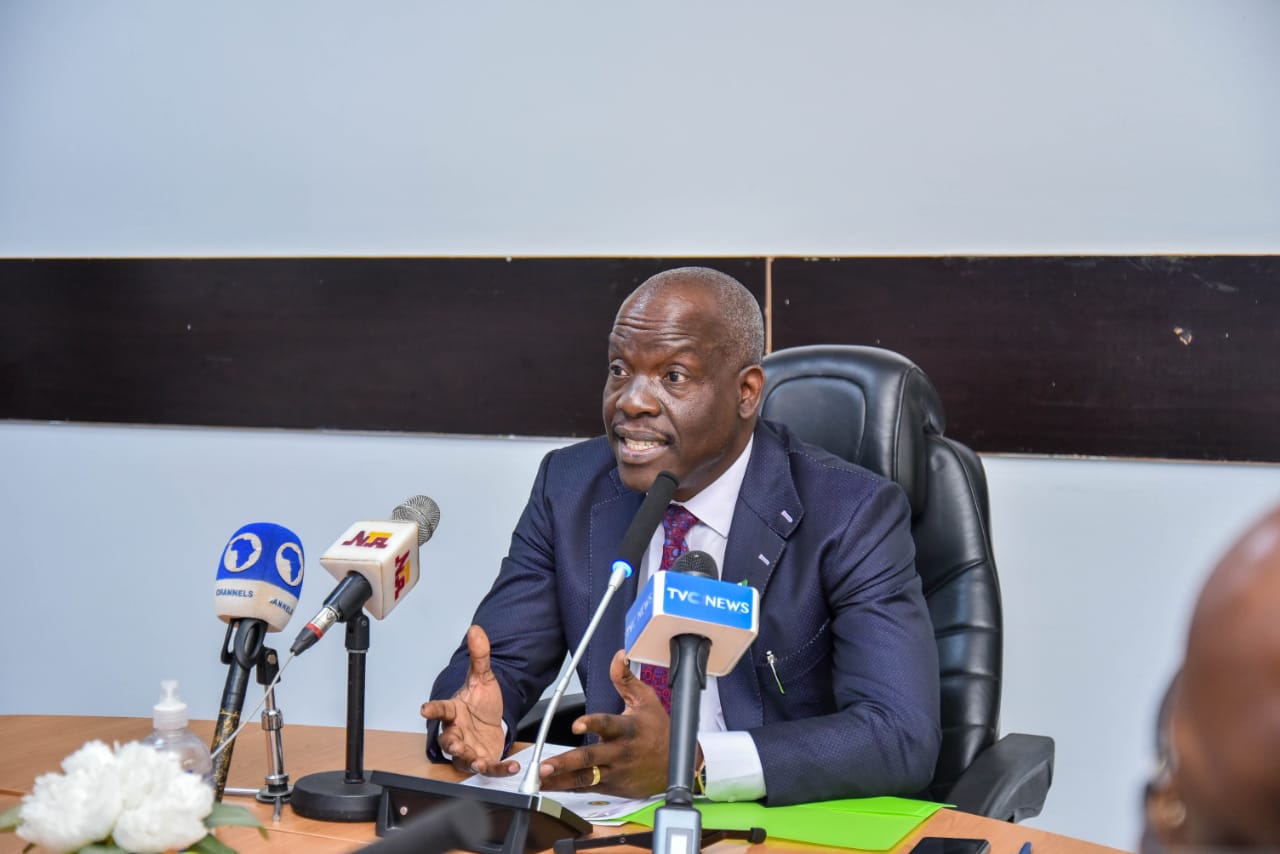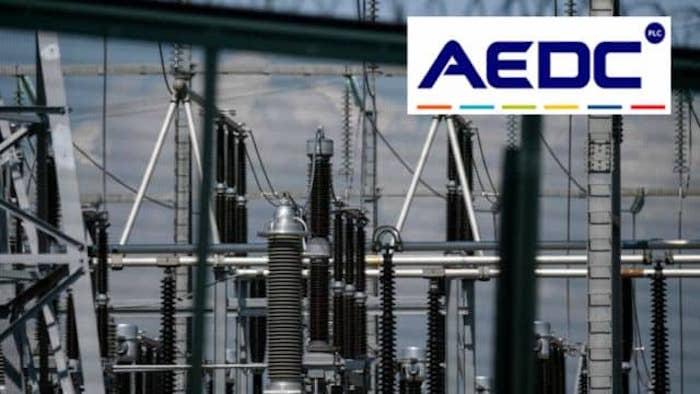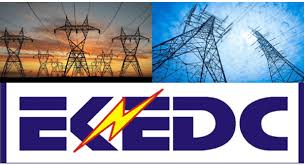Energy
MDAs owe EKEDC over N42bn — MD
Eko Electricity Distribution Company (EKEDC) has disclosed that Ministries, Departments and Agencies owed the DisCo over N42 billion to date.
The Chief Executive Officer, EKEDC, Dr Tinuade Sanda disclosed this during a customer engagement forum organised by the company on Thursday in Lagos.
Customers at the forum were drawn from various areas under Mushin District, including Ijesha, ltire, Lawanson, Ayilara, lshaga, Ojuelegba, Odunsi and Oke-Olu.
Sanda, who was represented by the company’s Chief Commercial Officer, Mrs Rekhiat Momoh, said the essence of the meeting was to interact with customers directly on issues of concern and address them instantly.
She said that the meeting showed the company’s empathy to consumers as one of its core value and to listen to their complaints and proffer solutions.
The EKEDC boss said that the forum was also to educate customers on how they can help the company to safeguard its facilities.
She said the take home is to ensure continuous engagement with customers, and explain what the company has done and some of the challenges facing the company.
On tariff increase, Sanda explained that the company has always been having minor reviews and not major reviews.
She added that the present tariff of the company is still not cost-reflective because it does not cover the company’s expenses both operations and CAPEX.
She explained that until there are tariff that is cost reflective, the business will not get to the expected desire.
“The average tariff in EKEDC is N59. 50k per kilowatts, while the increase is within the range of N2 to N5 which is not significant increase and not covering up for our expenses,” she said.
On infrastructure, the EKEDC boss said: “In the last one year, the company has replaced over a 1,000 wooden poles with concrete poles.
“The wooden poles were inherited from the defunct Power Holding Company of Nigeria (PHCN) and we decided to commence replacement for better and durable services. Currently, all the poles are concrete poles.”
On metering, Sanda said that out of 600,000 customers within the network operations, 405, 000 customers had been metered while about 154,000 customers are yet to be metered.
On energy theft, she said: “On monthly basis, the company is not getting 100 per cent payment collection; it is always an average of 82 per cent.
“The company is losing about 18 per cent of its collection to vandalism and energy theft, which is huge.”
The EKEDC boss solicited the support of electricity consumers and stakeholders in tackling energy theft and vandalism within the company’s network.
Sanda warned customers to desist from engaging in illegal connection to avoid facing the full wrath of the law and to report anyone found engaging in illegal use of energy without billing.
“We appeal to all our esteemed customers to report those within their community who engaged in energy theft to us.
“This is because, if you failed to report them or send their addresses to us, the illegal energy used will be paid by everyone.
“l admonished customers to desist from illegal connection and appeal to them to also report any case of illegal connections to EKEDC management.
“This can also be done via the company’s whistle blower platform [email protected] or any of its social media platforms.
“We plead with our customers to pay their bills on time to avoid the embarrassment of disconnection which may lead to being tempted to engage in illegal connection.
“As the ricocheting effect will not only impede progress in the power sector and affect revenue, but will also erode the quality of electricity supply to our customers,” she explained.
While warning of the dire sanctions for offenders, she noted that the offence is punishable under Section 94(3) of the EPSRA Act 2005.
According to her, culprits are liable to imprisonment for five to seven years.
The EKEDC boss reiterated the company’s commitment to curbing energy theft, vandalism and other illegalities perpetrated by unscrupulous elements within its network.
Mr Afeez Lawal, Chairman, EKEDC Customers Consultative Forum, Mushin Business District, commended the company for organising the interactive forum for customers to express themselves.
Lawal said: “We are peace loving people in this community; also EKEDC is very effective in discharging its duties.
“There is lot of improvement in EKEDC services currently, but it is obvious that human wants are insatiable and the means of meeting it are limited.
“We will try and have a memorandum with EKEDC management to see how some of the complaints can be resolved amicably and peacefully.”
Lawal said that the community has inaugurated a community security service at every unit of the district to trap down those perpetuating illegalities on EKEDC equipment.
“We will ensure that each CDA is a watchdog in their community as well as to keep vigilant in the cables, meters and transformers,” he said.
Energy
Divestments: Shell assets estimated at 4.96 billion barrels oil reserve – NUPRC


The Nigerian Upstream Petroleum Regulatory Commission (NUPRC) says the Shell Petroleum Development Company of Nigeria Limited (SPDC) assets being considered for divestments have an estimated reserve of 4.96 billion barrels of oil.
The Commission Chief Executive of NUPRC, Mr Gbenga Komolafe disclosed this on Monday in Abuja at the NUPRC-SPDC due diligence divestment workshop.
Komolafe said at the workshop that the assets have reserves of 1.77 billion barrels of condensate, 28.16 trillion cubic feet of associated gas and 28.11 trillion cubic feet of non-associated gas.
The workshop was aimed at discussing the proposed divestment of the participating interests held by SPDC in the SPDC JV Assets, through a sale by the shareholders of all the issued shares of SPDC to Renaissance Africa Energy Company Limited.
The SPDC JV assets are currently operated by the SPDC on behalf of its Joint Venture (JV) partners namely Nigeria National Petroleum Company Limited (NNPC Ltd.), Total Upstream Nigeria Limited, Nigeria Agip Oil Company and SPDC.
“To date, the assets have achieved a cumulative production of 5.35 billion barrels of crude oil, 165. 57 million barrels of condensate, 9.51 trillion cubic feet of associated gas and 3.75 trillion cubic feet of non-associated gas.
“These contribute to the achievement of Nigeria’s crude and condensate output.
“The assets being considered have an estimated total reserve of 4.96 billion barrels of oil, 1.77 billion barrels of condensate, 28.16 trillion cubic feet of associated gas and 28.11 trillion cubic feet of non-associated gas.
“This makes a significant contribution to the nation’s hydrocarbon resources.
“Additionally, these assets hold P3 reserves estimated at 2.85 billion barrels of oil, 850.85 million barrels of condensate, 11.3 trillion cubic feet of associated gas and 12.26 trillion cubic feet of Non-Associated Gas,” he said.
Komolafe said the due diligence meeting would enable the commission to identify a successor who would not only possess the requisite financial resources but also demonstrate the technical expertise to responsibly manage these assets throughout their lifecycle.
He further said that the commission would ensure that the inherent environmental and end-of-life liabilities such as decommissioning liabilities were accurately identified and assigned to the party best equipped to bear the associated risks.
This, he said would necessitate a comprehensive understanding of regulatory requirements, industry best practices and the unique challenges inherent in oil and gas operations.
“To this end, we have implemented robust measures to streamline regulatory procedures and eliminate unnecessary barriers to investment.
“Let me emphasise that the NUPRC wholeheartedly welcomes investment in the Nigerian upstream petroleum sector.
“We recognise the critical role investment plays in driving innovation, creating employment opportunities and ultimately fueling economic prosperity for our nation and its people.
“Therefore, we are always eager to welcome local and international investors who choose to invest in the Nigerian upstream petroleum sector,” he said.
He added that the commission was fully committed to facilitating and supporting investment initiatives that align with national development goals.
Komolafe urged SPDC and Renaissance to engage proactively, adhere to regulatory requirements and work collaboratively with the NUPRC to ensure the successful conclusion of the Shell Divestment.
“As regulators, we will ensure that this evaluation is conducted with precision and impartiality, with a focus on transparency and accountability,” he said.
He lauded President Bola Tinubu for his support and commitment towards ensuring a purposeful leadership that would attract investment and development of the country’s oil and gas sector.
The News Agency of Nigeria (NAN) reports that the NUPRC has developed a Divestment Framework consisting of seven cardinal pillars to guide the assessment of applications for Ministerial consent to the SPDC divestments and other similar divestments
Energy
NUPRC develops framework to guide Shell divestment, others


The Nigeria Upstream Petroleum Regulatory Commission (NUPRC) has developed a divestment framework to guide the assessment of applications for ministerial consent to the Shell Petroleum Development Company of Nigeria Ltd. (SPDC) divestment.
The NUPRC said the framework with seven cardinal pillars would also guide other similar divestments in the country.
The commission’s Chief Executive, NUPRC, Mr Gbenga Komolafe, said this at the NUPRC-Shell Petroleum Development Company of Nigeria Ltd. divestment workshop on Monday in Abuja.
The due diligence workshop aimed at discussing the proposed divestment of the participating interests in the SPDC JV Assets, through a sale by its shareholders of all the issued shares of the SPDC to Renaissance Africa Energy Company Ltd.
The SPDC JV assets are currently operated by the SPDC on behalf of its Joint Venture (JV) partners, namely, Nigerian National Petroleum Company Limited (NNPC Ltd.), Total Upstream Nigeria Limited, Nigeria Agip Oil Company and SPDC.
SPDC JV OMLs were originally awarded as Oil Exploration Licence -1(OEL-1) on Jan. 1, 1949, covering the whole of southern Nigeria and Cameroon.
Ultimately, the assets were converted to OMLs in April 1962 and subsequently renewed in 2014 and 2018 for 20 years.
Komolafe listed the cardinal pillars to include technical capacity, financial, legal, decommissioning and abandonment (D&A), host community trust /environmental remediation fund, industrial relations and labour issues and data repatriation.
On technical capacity, he said the successor entity must demonstrate verifiable capacity to operate the asset vigorously, while the NUPRC shall assess the prospective successor’s financial viability to undertake a defined programme and fulfil required obligations on the assets.
On the legal framework, he said the acquiring entity must be ‘fit and proper’ persons in the eyes of the law.
He added that clear evidence of resolutions of legacy debts and legal encumbrances must be established.
“Applicable decommissioning and abandonment costs must be diligently assessed and ensure settlement of outstanding obligations. Commission will ensure that potential exposure of the Nigerian government to decommissioning liabilities is averted.
“The commission shall assess the status of Host Community Trust Fund obligations and ensure the robustness of the successor entity’s adherence to decarbonisation plans and sound Environmental Social & Governance principles.
“The commission shall implement a robust assessment mechanism to avert undesirable labour union issues and disharmony arising from the divestment process.
“Concerned parties shall endorse a “Certificate of Settlement” to validate alignments reached on all labour issues (staff welfare, benefits, entitlements as well as disengagement, redundancies and retirement, among others).
“The aim is to ensure the nation averts socioeconomic disruptions arising from failure to resolve labour issues that might result because of post-divestment,” he said.
On data repatriation, the CCE emphasised that the commission would ensure that all data mined during the operating life of the asset were repatriated to the National Data Repository in line with extant regulations.
Komolafe, however, emphasised that the NUPRC would remain committed to free entry, free exit business principle aimed at encouraging investors in the sector.
Mr Wessel de Haas, General Manager, SPDC Assets and Deputy Managing Director, reiterated the significant contribution the company had made and expected to make in the future, toward Nigeria’s economic growth.
He anticipated a favourable outcome from the workshop with expectation of a due diligence process to finalise the divestment.
Energy
Power outage in FCT due to technical fault on some feeders – AEDC


The Abuja Electricity Distribution Company (AEDC), has attributed the power outage currently being experienced in parts of Abuja to technical fault on some of its feeders
The company’s management in a statement on Monday in Abuja listed the feeders affected as L36, H23, H33 and 8.
“This is to inform residents in parts of Abuja that the power outage currently being experienced is due to technical fault on feeders L36, H23, H33 and 8 respectively.
“Locations affected: are feeder L36-Entire Idu industrial, CITEC Estate, Efab Global, Babaginda Estate, Nizamaye Hospital and its environs.
“FH 23-Airport, River Park, Shoprite, NIPCO, Dunamis Church, NIGCOMSAT and its environs,’’ it said.
The company said that Feeder FH33 was also affected and this comprises Apo Mechanic Village, Waru Village and its environs
The company also said that Feeder 8 which has Jabi, Parts of Utako, Life Camp, Kado, Efab, Zango Daura, and Mbora Estates and its environs was also affected.
According to AEDC, its technical team is working tirelessly to rectify the fault and restore power supply as quickly as possible and regrets any inconvenience caused.
-
capital market2 years ago
Rt.briscoe, FBNH, Others halts negative performance of stock market
-
Finance3 months ago
Court orders Sen. Victor Umeh to repay N136m bank debt to AMCON
-



 Abuja Update2 months ago
Abuja Update2 months agoUNDP, FG partnership needed to achieve inclusion, equity- Minister
-
Abuja Update1 month ago
Banks drive stock market performance with N147bn gain
-



 Health3 weeks ago
Health3 weeks agoCapacity training will reduce migration of health workers- NPHCDA
-



 Business2 weeks ago
Business2 weeks agoTingo Group unveils Tingo Electric, Tingo Cola drink at Lagos launch
-



 Infotech1 month ago
Infotech1 month agoWorld Backup Day: NITDA urges Nigerians to ensure backup of data
-
News4 months ago
Oil thieves sponsoring malicious media campaign against Navy – Spokesman












